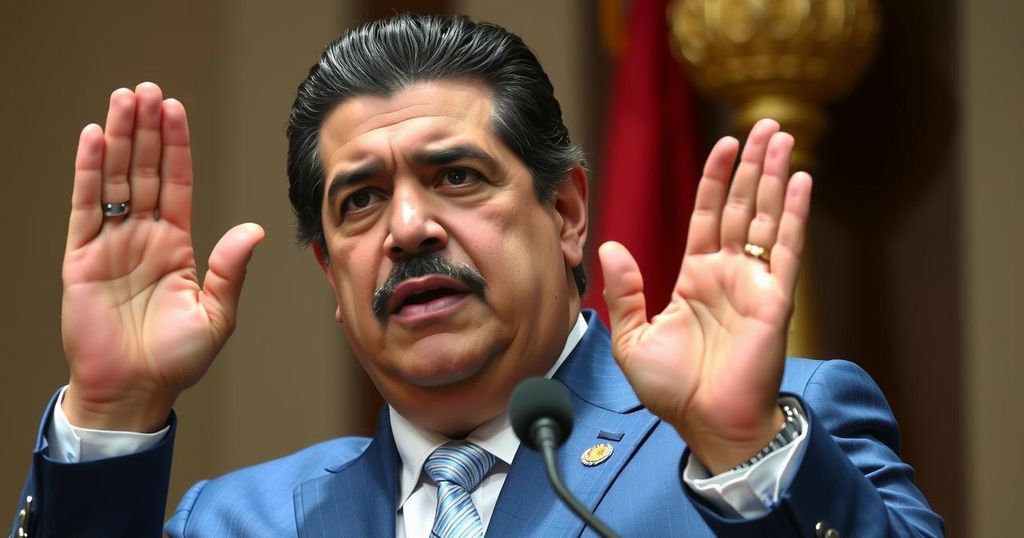Nicolas Maduro Sworn In for Controversial Third Term Amid Ongoing Protests

Venezuelan President Nicolas Maduro has been sworn in for a third term following a disputed election, facing accusations of voter fraud from opponent Edmundo Gonzalez. Despite international sanctions and calls for democratic governance, Maduro pledges a period of peace. Protests have erupted as the opposition seeks to challenge his rule, notably with US support for Gonzalez as the ‘president-elect’.
On Friday, Venezuelan President Nicolas Maduro was sworn in for a third term, despite substantial disputes surrounding the legitimacy of his re-election. His opponent, Edmundo Gonzalez, has accused the Maduro administration of voter fraud and declared that he won the election. Maduro, amidst ongoing international criticism and sanctions, which have been particularly pronounced from the United States, asserted his commitment to lead the country towards peace and prosperity, claiming that he received 51 percent of the votes during the July elections.
The inauguration follows a turbulent political climate, characterized by accusations of authoritarianism and economic turmoil under Maduro’s presidency, which began after the death of Hugo Chavez in 2013. Previously, in 2018, Maduro faced another contested electoral process, where key opposition figures were barred from participating. Subsequently, Juan Guaido, another opposition leader, proclaimed himself the legitimate president, a stance recognized by the US and several allies.
In light of these events, July’s elections were seen as an opportunity for the opposition to challenge Maduro peacefully. However, Maduro quickly declared victory despite international scrutiny and claims from Gonzalez that he won decisively. Criticism has been compounded by the Venezuelan electoral authorities’ lack of transparency, as they did not disclose the results typically expected from polling stations. More than 7 million Venezuelans have fled due to the country’s escalating crises.
The recent electoral process has ignited protests, although subsequent government crackdowns have led to numerous arrests and fatalities among demonstrators. Amid ongoing tensions, the US continues to express its support for Gonzalez, referring to him as Venezuela’s “president-elect.” Following his meeting with President Biden, Gonzalez articulated significant concerns regarding the repression faced by protestors and democracy advocates under Maduro’s administration.
In the face of this adversity, opposition leaders, including the recently detained Maria Corina Machado, have vowed to maintain their resistance against Maduro’s rule, organizing protests even in the lead-up to his swearing-in ceremony. Despite Maduro’s declaration of a new era of democracy, the opposition remains wary and prepared to contest his governance.
The political atmosphere in Venezuela has been intricate and fraught with tension, particularly since the ascension of Nicolas Maduro after Hugo Chavez’s death in 2013. The country has experienced repeated claims of electoral fraud, systematic repression of dissent, and economic instability, leading to a humanitarian crisis that has displaced millions. The opposition’s efforts to challenge Maduro have included boycotts of elections and international appeals for support, compounded by US sanctions aimed at pressuring his administration. The recent election and subsequent protests highlight the polarized political landscape and the continued struggle for democratic governance within Venezuela.
Nicolas Maduro’s swearing-in for a third presidential term has intensified the ongoing political crisis in Venezuela, sparking significant opposition and international condemnation. The claims surrounding electoral fraud by his competitor, Edmundo Gonzalez, and the support from the US for Gonzalez as Venezuela’s legitimate president underscores the intense scrutiny of Maduro’s rule. Amidst protests and internal strife, Maduro’s government faces substantial challenges, and the opposition continues to mobilize in its quest for democratic reform despite considerable risks.
Original Source: www.aljazeera.com








